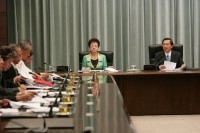News & activities
 News releases
News releases

President Chen Shui-bian presided over the Fifth Meeting of the Second Panel of the Presidential Economic Advisers this morning. Besides listening to a report given by Council for Economic Planning and Development Chairman Hu Sheng-cheng on Taiwan's income distribution and employment policies, and suggestions made by panel member Ko Cheng-en, the president issued an instruction at the conclusion of the meeting after exchanging views with the participants.
The president's speech is as follows:
According to major international economic forecasting organizations' projections, the global economic development's momentum is being influenced by the high oil price, violent fluctuation of the U.S. Dollar and impact of terrorist activities, and will be growing moderately. The newest forecast of the United Nations Department of Economic and Social Affairs showed that the annual increase in gross world product this year will fall to 3.25 percent from last year's 4.1 percent.
Although the momentum of economic growth is not as powerful as it was last year, I still expect the advisers and various government agencies, while facing such complexed economic and social situations, offer their wisdom and experiences in making pertinent recommendations and advices on the economic and social issues as important reference data for government decisions.
According to today's agenda, let us first hear the report from the Council for Economic Planning and Development's Chairman, Hu Sheng-cheng, on our country's income distribution and employment policies.
After the reports, the president made the following decisions:
Since the Presidential Economic Advisers Panel was formed two years ago, the discussions were principally focused on economic development strategy, improvement of the country's economic environment and boosting the effects of the government's economic policies. However, in the path of world economic development, phenomena such as unbalanced distribution, abnormal unemployment rate often influenced the normal development of the entire socio-economic structure because of a malfunctioning market, asymmetric information and imbalanced changes in different industries' value added growth.
Therefore, I especially suggested at a meeting in August last year when the panel was undergoing restructuring that the panel should include issues, such as the income gap, income distribution and tax reform, which are of great concern to social fairness and justice, into its researches, thus enabling Taiwan to develop a more harmonious and safe society while at the same time pursuing economic development.
The "tax reform" issue which was discussed at the last meeting and the "income distribution and employment strategy in Taiwan" that is being discussed today are aimed at expanding the "circle of winners" and realizing social equity and justice through the putting in of more resources and efforts. In concluding the discussion today, aside from the recommendations made by the panel and other participants of the meeting on income distribution and employment issues, I would like to make the following announcements:
1. According to cross-country statistical data released from major international economic forecasting organizations, the Taiwan household income distribution gap in 2003 was 6.07 times, although this phenomenon might slightly increase with the economic growth, yet it is still considered to be more or less in a balanced situation comparing with South Korea's 6.8 times, the United States' 10.2 times, Hong Kong's 17.7 times and Singapore's 20.9 times. This development is especially noteworthy when comparing with the statistics in 2001 which was 6.30 times and 6.16 times in 2002, showing the income gap has the tendency of diminishing. In the future, the government will try to ease the expansion of the income gap through effective economic reforms.
2. According to academic researches, major global industrialized countries all face the trend of a continuing expansion of income distribution gap in this era of knowledge economy. As an example, the United States' income distribution has grown to 10.2 times in 2001 from the 8.75 times in 1996. The most efficient approach to ease income distribution deterioration is through reinforcement in educational investment, improving employment guidance mechanism and introducing tax reform so that there would be more opportunities for the weaker groups in society to seek advancement and betterment.
3. Regarding the improvement of unemployment rate, the "On-the-Job Youth Training Program" and "Subsidy to Enterprises Employing the Unemployed Program" that were launched last year have achieved marked success. Concerned government agencies should earmark bigger budgets and urge the private sector to join in expanding these endeavors. Besides that, targets should also be set with adequate investment in providing assistance to minority groups such as aboriginal people, foreign brides, young people and women to land on jobs to cut the unemployment rate.
4. According to local and foreign academic researches, the more labor conditions are intransigent, the less it is favorable to improving unemployment rate. Therefore, the authority in charge of making labor policies has to aggressively work out a plan to make labor laws more flexible with an aim of raising employment rate, which of course will cover Non-Profit Organizations (NPO) and Non-Governmental Organizations (NGO).
5. In the previous meeting, we had already discussed about tax reform's major directions. Its goal is not only aimed at realizing social equity and justice, but also to strengthen the accumulated efficiency of tax institution, improve the government's finance and increase the government's capability in investing in social security programs. I hope that the administrative departments and the law-making departments could actively coordinate efforts to realize the tax reform as soon as possible.
6. Regarding the three issues, such as how to attract more foreign investments, how to lower the dependency on China and how to use policies such as tax amnesty to lure back Taiwan capital from overseas, I hope each of the advisers would proceed with the related researches and take part in the discussion at the next conference.


